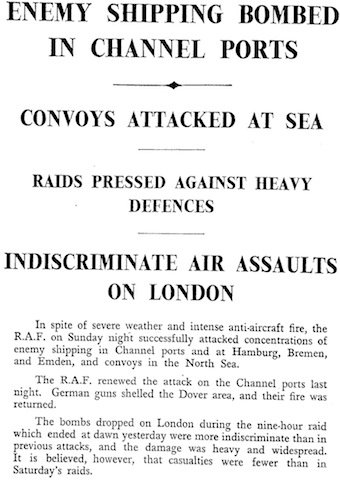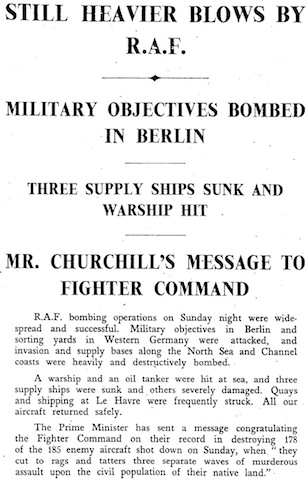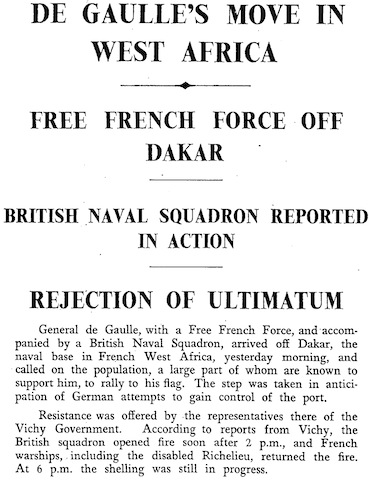
As with the Daily Mail yesterday, The Times doesn’t give the bombing of London the biggest headlines (4). Those are reserved for the RAF’s bombing of enemy shipping in the Channel ports, which the Germans are concentrating in readiness for the invasion, and this is the lead story along with Bomber Command’s raid on Hamburg. There is, however, a column of news on the air war overhead: the Air Ministry reports that 47 enemy aircraft were shot down yesterday (2 by anti-aircraft fire, the rest by fighters), with 13 British losses. There was a daylight raid on London, beginning at about 5.10pm; there are gratifying accounts of bombers crashing onto roads or exploding in midair, as well as less happy ones of civilians killed by their deadly cargo. Part of the reticence to give over the main news page to the bombing may be explained by the leading article on page 4, which tries to downplay the extent of the raids somewhat:
Certainly the material damage done on Sunday was again extensive and the loss of life severe: but again this may be described as not serious when measured by the grand scale of the war […] the raiders seem to have come over in small numbers at a time, and there was never a concentrated attack by so large a force upon a single localized objective as on Saturday had caused such damage by fire in the area of the Docks.
It is however accepted that ‘these attacks will continue nightly for some time to come’, and that London must therefore ‘steel itself’.
The enemy is making an effort with something like his full strength to destroy the fighter defence, break down communications, and disorganize civil life — according to his own announcement as a prelude to invasion. What is now taking place is, of course, no more than a year ago was expected to be the routine of war for civilians from the very first day.
The main news of London’s ordeal is on page 2, in the ‘Home News’ section. There the aeronautical correspondent reports on the biggest raid so far on London — 9 hours long, ending only at dawn on Monday — and backs up the editorial position about German intentions:
The night raids have the further object of trying to undermine the spirit of the population, to create panic, dislocation, and inconvenience, and to split the determined national front by emphasizing alleged deficiencies in the ground and air defences.
If the ‘British people […] refuse to be rattled’ by these attempts then ‘we shall win through’. He does admit that ‘We could do with more anti-aircraft guns’, but production of new ones is ‘going ahead at a satisfactory rate’. And he says that more night fighters are being added to the air defences and ‘a new system of night defence is being planned’, which ‘may go some way towards solving the difficult problem of night interception’.
Various dignitaries — the King, the Prime Minister, the Minister of Food — have visited the East End, to see the damage and inspect the work of the ARP services. One might think that they are there to give a fillip to morale, but on these accounts that’s not needed:
At the scenes of the greatest damage he [the King] was received with demonstrations of loyalty, in which many people rendered homeless by the raids joined. On several occasions he expressed his admiration for the spirit and determination of the people amid their suffering.
Lord Woolton was ‘proud of the moral of the people he had visited’:
“It is astonishing,” he said, “how calm and cheerful these folk who went through terrifying times, and lost homes and everything, still are. One man I talked with was injured, but his one concerned was to get back to work. All of them are magnificent.”
However, while Churchill was also ‘deeply impressed’ by the ‘resilient spirit of the civil population in a grim ordeal’, all that is actually recorded of their reactions is that
Mr. Churchill was cordially greeted while he was making his tour of damaged streets.
‘[C]ordially greeted’! I think the parliamentary correspondent, who wrote up Churchill’s ‘visit’ to the East End, should take a leaf out of the book of whichever reporter accompanied the King when he was ‘touring’ the same area:
Near the docks a number of people were removing their belongings from a damaged block of flats, and one woman called out, “Are we downhearted?” All responded with a hearty “No.”
That’s colour.
Finally, back on page 4 here’s one for the secret weapons file. A ‘special correspondent’ reports that ‘military circles in Rome’ believe that the German army is experimenting with ‘special searchlights, believed to be capable of penetrating the English “pea-soup” fogs’.
The reports say that the experiments, which began soon after the armistice with France, aim at discovering an application of the principle of infra-red rays which have already been proved of high military value in night photography from the air.
The searchlights ‘would be used with all mechanized units, including tanks’ in a German invasion of Britain. The special correspondent (who would be a neutral, possibly an American, since Italy is now an enemy state) thinks that this is a ‘further attempt to use the psychological “secret weapon,”‘ and that the fact that it is being discussed at all suggests that an invasion is not planned ‘in the immediate future’.
![]() This work is licensed under a Creative Commons Attribution-NonCommercial-NoDerivatives 4.0 International License.
Permissions beyond the scope of this license may be available at http://airminded.org/copyright/.
This work is licensed under a Creative Commons Attribution-NonCommercial-NoDerivatives 4.0 International License.
Permissions beyond the scope of this license may be available at http://airminded.org/copyright/.




Pingback: Airminded · Sunday, 22 September 1940